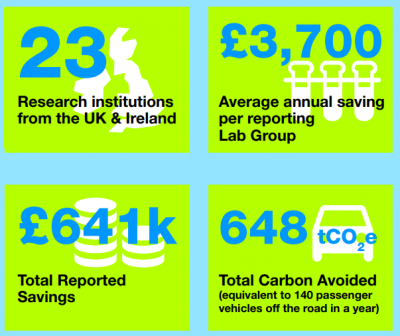LEAF impact
Sustainability impact of science
Laboratories are resource intensive; utilising significant amounts of energy and water to run equipment and maintain environmental conditions (a typical lab will consume 3-10 times more energy per m2 than standard office spaces). Unlike Health & Safety regulations, there is a lack of standards in place providing simple guidance on how to make labs more environmentally sustainable.
LEAF has been developed to address this lack of standards. It is user-friendly with low administration, ensuring there is enough time for the science at hand. LEAF’s calculators enable users to estimate their impacts immediately, and its supporting resources provide the technical expertise to take meaningful action.
Crucially, LEAF is user-driven and non-profit – users are encouraged to feedback on how the programme may be improved. No manufacturers, suppliers, or commercial entities have input in LEAF’s contents, process, or materials.
As funders are taking action in driving sustainability into science, and institutions work towards impressive carbon targets, we hope LEAF can serve as a means of getting us where we need to be a bit quicker!
LEAF's pilot savings

- 235 Lab groups took part;
- £3700 average annual saving reported by Lab group;
- £641k total reported savings;
- 648tCO2e total carbon avoided (equivilent to 140 passenger vehicles off the road in a year);
- 99% of those surveyed said they would use LEAF again.
Further reading
- Find a Green Lab network
- Further advice to make your lab greener
- Nature's article citing LEAF: What can you do to make your lab greener?
- Read a paper on plastics produced in laboratories;
- Green Solvents from Royal Society of Chemistry & Chem21;
- Find out more about how to run ULT freezers efficiently;
- Read about the factors affecting the performance, energy consumption, and carbon footprint for ULT freezers;
- Can UCL scientists win the race against single-use plastics?.
- Other green lab programmes from around the world
 Close
Close

